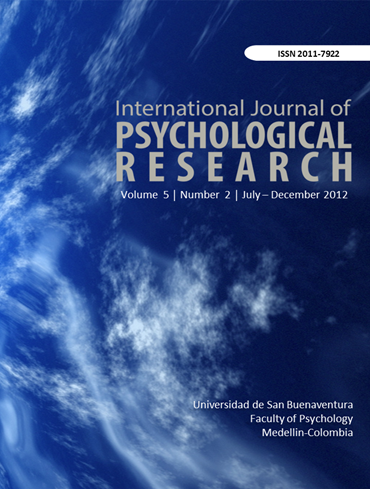Ver/Descargar
Cómo citar
Krumm, G., & Lemos, V. (2012). Actividades artísticas y creatividad en niños escolarizados argentinos. International Journal of Psychological Research, 5(2), 40–48. https://doi.org/10.21500/20112084.735
Más formatos de cita
Términos de licencia
▼
The work that is sent to this journal must be original, not published or sent to be published elsewhere; and if it is accepted for publication, authors will agree to transfer copyright to International Journal of Psychological Research.
To give up copyright, the authors allow that, International Journal of Psychological Research, distribute the work more broadly, check for the reuse by others and take care of the necessary procedures for the registration and administration of copyright; at the same time, our editorial board represents the interests of the author and allows authors to re-use his work in various forms. In response to the above, authors transfer copyright to the journal, International Journal of Psychological Research. This transfer does not imply other rights which are not those of authorship (for example those that concern about patents). Likewise, preserves the authors rights to use the work integral or partially in lectures, books and courses, as well as make copies for educational purposes. Finally, the authors may use freely the tables and figures in its future work, wherever make explicit reference to the previous publication in International Journal of Psychological Research. The assignment of copyright includes both virtual rights and forms of the article to allow the editorial to disseminate the work in the manner which it deems appropriate.
The editorial board reserves the right of amendments deemed necessary in the application of the rules of publication.
To give up copyright, the authors allow that, International Journal of Psychological Research, distribute the work more broadly, check for the reuse by others and take care of the necessary procedures for the registration and administration of copyright; at the same time, our editorial board represents the interests of the author and allows authors to re-use his work in various forms. In response to the above, authors transfer copyright to the journal, International Journal of Psychological Research. This transfer does not imply other rights which are not those of authorship (for example those that concern about patents). Likewise, preserves the authors rights to use the work integral or partially in lectures, books and courses, as well as make copies for educational purposes. Finally, the authors may use freely the tables and figures in its future work, wherever make explicit reference to the previous publication in International Journal of Psychological Research. The assignment of copyright includes both virtual rights and forms of the article to allow the editorial to disseminate the work in the manner which it deems appropriate.
The editorial board reserves the right of amendments deemed necessary in the application of the rules of publication.
Resumen
Este trabajo pretendió evaluar si la realización de actividades artísticas influye en la creatividad. Se evaluó a 301 niños de 8 a 14 años de edad. Se estudió la creatividad desde una evaluación multicomponente, utilizando diversas técnicas (sociograma, test y escalas) y diferentes informantes (pares, padres y el propio niño). Los resultados encontrados indican consistentemente que los niños que realizan actividades artísticas obtuvieron puntuaciones más elevadas en la creatividad evaluada desde: la producción de dibujos (prueba de figuras del Test de Pensamiento Creativo de Torrance), la valoración parental y la autoevaluación de la personalidad creadora del niño (Escala de Personalidad Creadora hetero y autoevaluación de Garaigordobil, 2004), y la evaluación realizada por sus pares (Sociograma “Compañero Creativo” de Garaigordobil, 2004).
Palabras clave:
Referencias
Bukowski, W. M. & Hoza, B. (1989). Popularity and friendship: Issues in theory, measurement, and outcome. En T. Berndt & G. Ladd (Eds.), Peer relationships in child development (pp. 15-45). New York: Wiley.
Bunt, L. & Alberman, E. (1981).The role of music therapy with handicapped children in a London district. A pilot study. British Journal of Music Therapy, 12, 2.
Caf, B., Kroflic, B. & Tancig, S. (1997). Activation of hypoactive children with creative movement and dance in primary school. Arts In Psychotherapy, 24(4), 355-365. doi:10.1016/S0197-4556(97)00016-6
Csikszentmihalyi, M. (1998). Creatividad. El fluir y la psicología del descubrimiento y la invención. España: Paidós.
Eisner, E. W. (1993). Prólogo. En Arnheim, R. Consideraciones sobre la educación artística. Barcelona: Paidós.
Eisner, E. W. (1995). Educar la visión artística. Barcelona: Paidós.
Elisondo, R., Donolo, D. y Rinaudo, M. C. (2012). Espacios comunitarios cotidianos. El arte como oportunidad para ser, crear y transformar. Arte y Sociedad. Revista Investigación,1. Recuperado de http://asri.eumed.net/1/edr.html.
Esquivias, M. (2004). Creatividad: definiciones, antecedentes y aportaciones. Revista digital universitaria,5(1). Recuperado de http://www.revista.unam.mx/vol.5/num1/art4/art4-2.htm
Ferrando Prieto, M. (2006). Creatividad e inteligencia emocional: un estudio empírico en alumnos con altas habilidades (Tesis doctoral, Universidad de Murcia. Departamento de Personalidad, Evaluación y Tratamiento Psicológico). Recuperado de http://www.tesisenred.net/ TESIS_UM/AVAILABLE/TDR-0403107-103000/FerrandoPrieto.pdf
Bunt, L. & Alberman, E. (1981).The role of music therapy with handicapped children in a London district. A pilot study. British Journal of Music Therapy, 12, 2.
Caf, B., Kroflic, B. & Tancig, S. (1997). Activation of hypoactive children with creative movement and dance in primary school. Arts In Psychotherapy, 24(4), 355-365. doi:10.1016/S0197-4556(97)00016-6
Csikszentmihalyi, M. (1998). Creatividad. El fluir y la psicología del descubrimiento y la invención. España: Paidós.
Eisner, E. W. (1993). Prólogo. En Arnheim, R. Consideraciones sobre la educación artística. Barcelona: Paidós.
Eisner, E. W. (1995). Educar la visión artística. Barcelona: Paidós.
Elisondo, R., Donolo, D. y Rinaudo, M. C. (2012). Espacios comunitarios cotidianos. El arte como oportunidad para ser, crear y transformar. Arte y Sociedad. Revista Investigación,1. Recuperado de http://asri.eumed.net/1/edr.html.
Esquivias, M. (2004). Creatividad: definiciones, antecedentes y aportaciones. Revista digital universitaria,5(1). Recuperado de http://www.revista.unam.mx/vol.5/num1/art4/art4-2.htm
Ferrando Prieto, M. (2006). Creatividad e inteligencia emocional: un estudio empírico en alumnos con altas habilidades (Tesis doctoral, Universidad de Murcia. Departamento de Personalidad, Evaluación y Tratamiento Psicológico). Recuperado de http://www.tesisenred.net/ TESIS_UM/AVAILABLE/TDR-0403107-103000/FerrandoPrieto.pdf
Descargas
Los datos de descargas todavía no están disponibles.

































